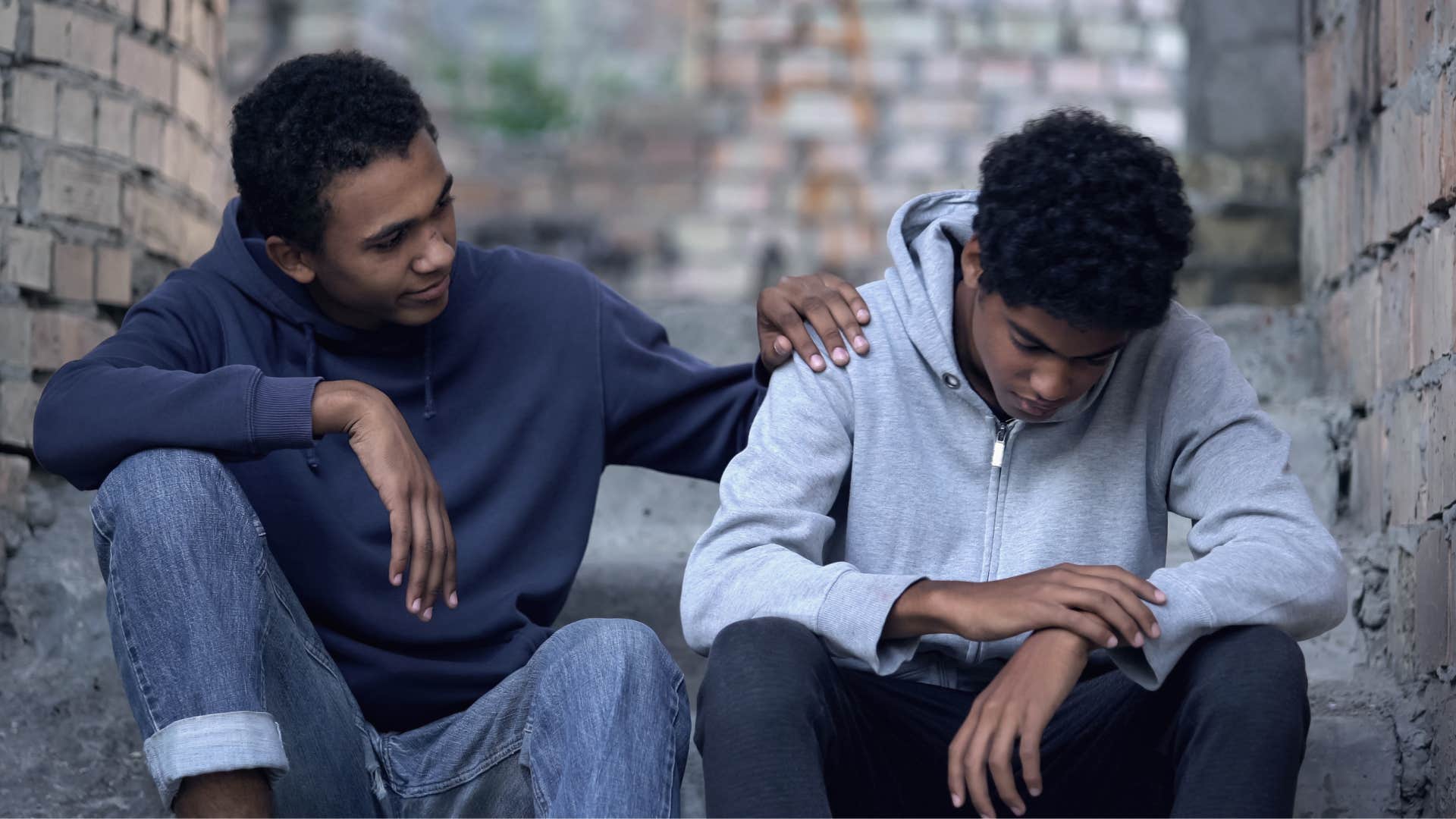If Someone Is Only Pretending To Be Your Friend, They'll Say These 11 Phrases Often
A true friend won’t use these backhanded phrases against you.
 Synergic Works OU | Shutterstock
Synergic Works OU | Shutterstock Friendships are usually built on mutual trust, but not every connection we make is genuine. Some people wear masks, often hiding their true intentions behind compliments and carefully chosen words. These individuals may not always have our best interests at heart and can push us to act out of character to turn others against us. Spotting a fake friend is usually easy because of the phrases they use during some of your most difficult times.
When you're going through something personal, they will be the first to play both sides and turn things around on you. Their passive-aggressive statements might surprise you because you never knew they truly felt that way about you, but hopefully it will make you more cautious about sharing certain information with them in the future.
If someone is only pretending to be your friend, they'll say these 11 phrases often:
1. 'I'm just being honest'
 Alena Lom | Shutterstock
Alena Lom | Shutterstock
People pride themselves on having an extremely blunt friend until that friend starts to tell you the harsh truths about yourself. Some friends do this to try and help you see the dark parts of yourself, but others might use honesty as an excuse to tell you how they really feel. You can tell the difference by whether or not they are projecting their own perceptions onto you.
If you feel like their criticism is more about them than you, then chances are they are projecting their issues. This can cause normally honest people to fall into a trap with a dishonest friend. People who see themselves as more honest believe that their friends behave the same way. However, not everyone is honest, and you need to watch out for friends who use honesty as a weapon against you.
2. 'You're too sensitive'
 PeopleImages.com - Yuri A | Shutterstock
PeopleImages.com - Yuri A | Shutterstock
The way to know if you're sensitive is simply to ask yourself whether you care about how others perceive you. If you care what people think, then you might take things personally when criticized, but if you don't care, then your skin is tough enough to handle it. Being told that you're too sensitive doesn't necessarily mean there's something wrong with you, but if the response comes without understanding, then it says more about them than you.
It all depends on what your friend has said to you. For example, if a friend disrespects you and then claims that you are too sensitive, it means you have every right to be upset. However, if it was a mild comment that was taken out of context and had nothing to do with the situation, then maybe you are reacting sensitively. Sensitivity is not a flaw but simply a trait that reflects a person's level of empathy; the more sensitive they are, the more empathetic they tend to be.
3. 'I was just joking, relax'
 MDV Edwards | Shutterstock
MDV Edwards | Shutterstock
Joking is a way friends express their identities, values, and status within their groups. If the joke is made when someone is absent, it is more genuinely accepted as a bonding tool than when they are present. When certain friends feel less accepted by others in their group, they tend to use more aggressive jokes to bridge the gap or test boundaries.
These kinds of friends often say hurtful things just to later dismiss them by claiming they were joking. When you feel upset and share your feelings, a genuine friend would apologize right away. Someone who keeps dismissing your emotions with comments like these doesn't truly care about your feelings or respect your boundaries.
4. 'Why do you always need help?'
 fizkes | Shutterstock
fizkes | Shutterstock
Whether it's a joke or not, some friends will constantly judge your situation without truly understanding it. For those who are constantly in financial trouble, a friend asking why they always need help might seem dismissive or even accusatory. A person pretending to be your friend will refuse to help you even if they always tell you how much they support you.
Instead of listening or showing you sympathy, they will take your vulnerability and use it against you. It's a way they make themselves feel superior to you and find an excuse to shame you publicly. True friendship isn't just about give and take; it needs compassion to survive.
5. 'I won't tell anyone, I promise'
 Prostock-studio | Shutterstock
Prostock-studio | Shutterstock
Some friends need reassurance from others when they constantly gossip behind your back or tell everyone your business, while others do it because they secretly hold a vendetta against you. A friend who shares your secrets after promising not to is not a true friend but a pretender. While you trust them with sensitive information, they are spreading it to anyone who comes along, whether they know you or not.
Fake friends who make promises they can't keep will never be trustworthy. The only real thing you can do in this situation is to cut them out entirely and let them spread false rumors about you instead. Whether or not people believe them is none of your concern anymore because you know they will just keep driving away anyone who tries to get close with their loose lips.
6. 'I thought you knew'
 BearFotos | Shutterstock
BearFotos | Shutterstock
Friends usually respect the boundaries of your relationship with your romantic partners. That's why the spread of the 'bro code' and 'girl code' exists, as a way to shame people publicly who get involved with their friends' ex-partners. A close friend coming to you as a woman and saying they thought you knew about their affair with your husband is not ideal, but it's a fairly common situation.
Contrary to the common belief that infidelity involves strangers or casual encounters, most married people who cheat do so with someone they know well, like a close friend. These friends often harbor some form of jealousy towards your romantic partner and the life you share. Sometimes they want to be you, while other times they simply want to shift your attention away from your relationship and back onto your friendship. The problem is that once they do this, there’s usually no more friendship left to save because it becomes an unforgivable offense to you.
7. 'It's not a big deal'
 Motortion Films | Shutterstock
Motortion Films | Shutterstock
Friendship betrayals tend to hurt more than romantic ones because you spend most of your relationship building emotionally. You share secrets, gossip, and discuss your traumatic past. So, when a friend uses those things against you to gain favor with another group, it can be painful, especially when they say it's not a big deal. We see this during adolescence when one teen is accepted by the popular crowd while another is publicly shunned.
Negative or harmful dynamics in friendships, such as emotional coercion and relational manipulation, are surprisingly common during adolescence. Actions like turning others against someone or social exclusion from friend groups can cause the targeted person to experience more depressive symptoms. These fake friends can do more harm than good, and despite trying to reassure you that they will change, they almost never do.
8. 'You owe me'
 Nicoleta Ionescu | Shutterstock
Nicoleta Ionescu | Shutterstock
An egotistical friend may feel like you owe them a debt just for interacting with them because they truly believe you wouldn’t be anyone without them. They often use their generosity or favors as leverage over your friendship, making you feel as if you owe them something. These kinds of friends enjoy being in control, and when you threaten that control, they start calling you ungrateful.
The easiest way to deal with these kinds of fake friends is to put them in their place. Hold up a mirror to their behavior by saying things that will rattle their fragile egos. You have to make them see just how imperfect they really are and that you are just fine without them.
9. 'I didn't think it was important to tell you'
 fizkes | Shutterstock
fizkes | Shutterstock
When it comes to male and female friendships, a lot of misunderstandings can happen. One person might develop romantic feelings for the other, while the other person isn't interested and somehow manages to lead them on. However, it’s wrong to lead someone on and then tell them you didn't think it was important to tell them you were seeing someone else, and vice versa.
People who want more often pretend to be friends with their crush and lead them on. Sometimes, someone in a new relationship will end a friendship just because their partner wants them to or feels threatened. In this complicated and messy situation, we can all agree that wasting each other's time is wrong.
10. 'I was busy'
 Roman Kosolapov | Shutterstock
Roman Kosolapov | Shutterstock
Trying to explain to your close friend that you were busy and that's why you couldn't attend their event might not seem like a big deal until it happens frequently and with malice. A person who is a no-show and ghosts you all day is a fake friend because only a true friend would tell you what's going on. In some cases, it's not so clear whether they are genuinely busy or just trying to avoid you.
Being honest about your busyness can help them understand and reaffirm that you still care about them. However, some friends are not satisfied with that, especially if you are known for flaking out on almost all events they invite you to. Showing up for your friends is all about supporting them, and a fickle friend will never be reliable enough to count on.
11. 'You're lucky to have me'
 Ekateryna Zubal | Shutterstock
Ekateryna Zubal | Shutterstock
All friendships have their ups and downs, but when conflict occurs, emotions tend to spiral out of control. Sometimes, one friend might remind the other how lucky they are to have them. While it may seem like a genuine compliment, especially if the friend is usually nice, if that friend is known for being selfish, it can come across as a bit out of touch.
This type of comment comes from someone who wants to keep you emotionally dependent and off-balance. By making this statement, they imply that others might not have been as lucky to be your friend and that you should settle for them. People who pretend can't do it forever and will eventually reveal how they really feel.
Sylvia Ojeda is a screenplay writer and journalist who covers self-help, relationships, culture, and human interest stories.

